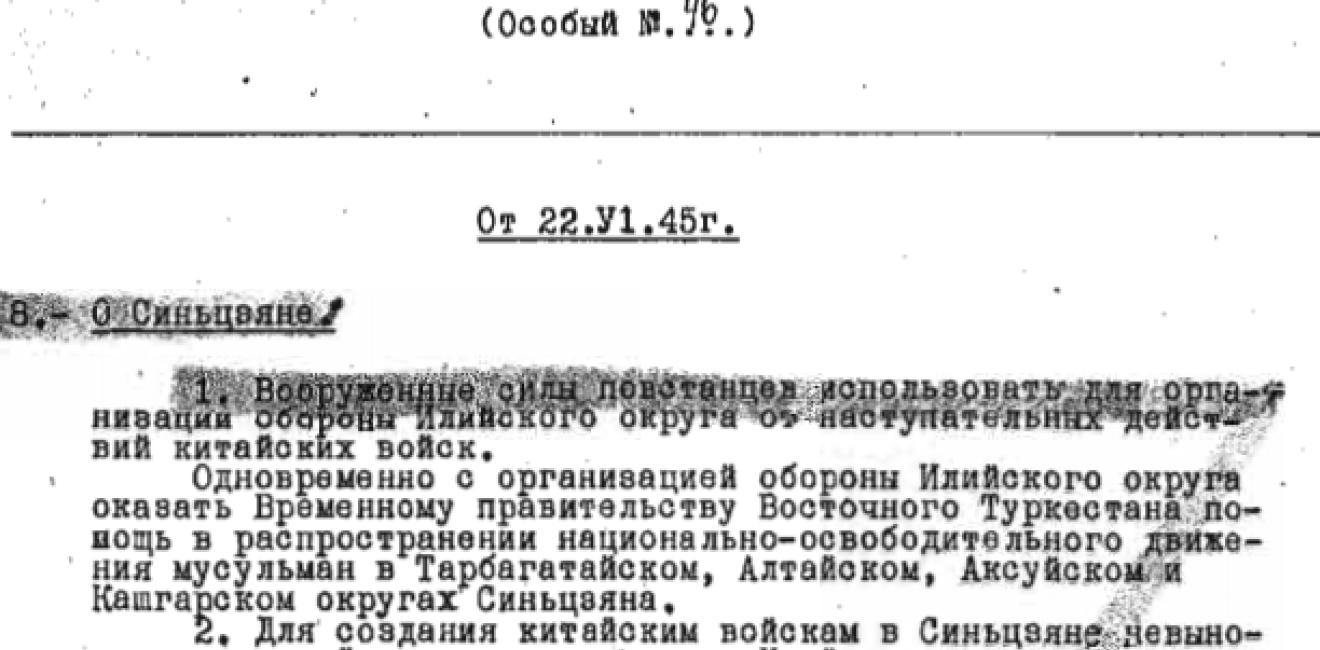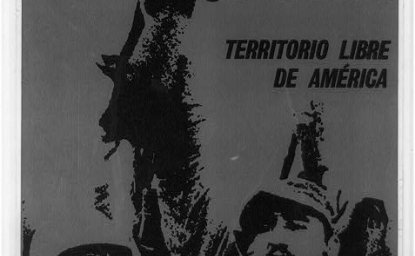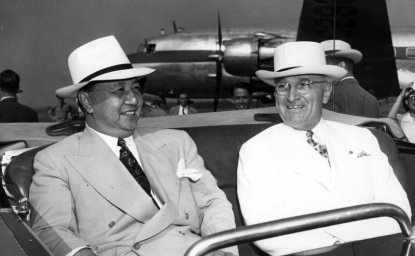The Soviet Archives and Xinjiang, 1944-1949
Newly opened Soviet archives help to clarify Soviet policy toward Xinjiang during a pivotal period in Chinese and Inner Asian history.

A blog of the History and Public Policy Program
Newly opened Soviet archives help to clarify Soviet policy toward Xinjiang during a pivotal period in Chinese and Inner Asian history.

For many years scholars in Russia, China, and the West have debated the extent of Soviet involvement in the rebellion that took place in northern Xinjiang and led to the creation of the East Turkestan Republic, a de facto independent state that existed from 1944-1949. Newly opened Soviet archives help to clarify Soviet policy toward Xinjiang during this period. These sources are analyzed in my Russian-language book, titled Синьцзян в орбите советской политики: Сталин и мусульманское движение в Восточном Туркестане: 1931-1949: монография, published in 2015. In addition, I donated copies of many of the documents to Wilson Center’s Digital Archive, and they have since been translated into English and published online.
Moscow decided the fate of Xinjiang in spring 1943, when heavy combat operations on the Soviet-German front were still underway. On May 4, 1943, the VKP(B) CC Politburo adopted a secret decree titled “On Xinjiang.” The decree stated that the Soviet Union could no longer “tolerate” the Governor of Xinjiang, Sheng Shicai, and that the USSR should support non-Chinese rebels “in their struggle against the repressive colonialist policy of the Governor.” On June 22, 1945, the Politburo of the Central Committee of the Communist Party of the Soviet Union passed another decision to assist the Eastern Turkestan Republic. On September 15, 1945, the Politburo returned to the Eastern Turkestan issue, this time agreeing to act as a broker between the rebels and the Chinese government.
With the mediation of the USSR, the Republic of Eastern Turkestan entered into an agreement with the Chinese government on June 6, 1946. However, the Soviet Union soon believed that the Republic of China was not in compliance with the treaty, and tried to regain control over the complicated situation in Eastern Turkestan twice, in February and again in September of 1947.
The Politburo of the Central Committee of the AUCP(B) received more than 60 secret decisions concerning the political, military, and economic life of Xinjiang and the operations of Soviet special services and punitive agencies during their time operating in the region. Among the party documents of particular value are the materials from the foreign policy department of the Central Committee of the Communist Party of the Soviet Union (CPSU). This department developed and monitored national and local bodies, governing directives of an ideological nature, and organizational methods to support the separatist movement in Xinjiang.
Most of the documentary sources on Soviet policy in Xinjiang from 1944 to 1949 are kept at the State Archive of the Russian Federation (Gosudarstvennyi Arkhiv Rossiiskoi Federatsii, GARF) in the Special Folder of Josef Stalin, the Special Folder of Viacheslav Molotov, and the Special Folder of Lavrentii Beria. These documents consist mainly of memoranda, analytical notes, and reports of the heads of the People’s Commissariat of Internal Affairs (NKVD) and People’s Commissariat of State Security (NKGB). Such sources make it possible to reconstruct developments in Xinjiang and the evolution of Soviet policy toward the region.
In the State Archive of the Russian Federation in Moscow, there is also a collection titled “Xinjiang, Iranian Azerbaijan, Turkey 1941–1953.” Most of the collection deals with Soviet policy in Xinjiang, including discussions on oil development, Soviet specialists’ academic visits to the region, medical center operations, trade and correspondence with Xinjiang, and the potentiality of USSR citizenship for those entering the Soviet Union from that region.
Many secret documents related to the revolutionary movement in northern Xinjiang are also kept at the GARF. In December 1944, the USSR Commissar of Internal Affairs, Lavrentii Beria, ordered the creation of a special tasks department. Its main mission was to lead the national-liberation movement of Xinjiang Muslims and render all necessary assistance to its participants. With Stalin’s consent, Major-General Yegnarov and a group of Soviet officers were sent on an assignment to the Ili District in the East Turkestan Republic to organize the rebels’ combat operations against the Chinese Army. The Russian State Archives also contain several letters to Stalin from Alihan Tore Shakirjan, the head of the Eastern Turkestan national government.
Additional important information about Soviet activity in Xinjiang in the 1940s is kept at the Archive of Foreign Policy of the Russian Federation (Arkhiv Vneshnei Politiki Rossiiskoi Federatsii, AVP RF). Of great interest in this collection are materials from the collections of Foreign Commissar Viacheslav Molotov, Deputy Foreign Minister Sergei Lozovskii, Minister of Foreign Trade Anastas Mikoian, and others.
Materials of the Archive of the President of the Russian Federation (Arkhiv Prezidenta Rossiiskoi Federatsii, APRF) are useful in regard to Anastas Mikoyan’s secret mission to China during the Chinese Civil War, including his talks with Chairman Mao and other leaders of the Chinese Communist Party. Mikoyan’s visit to China at this stage helped to clarify Soviet policy toward China in general and toward Xinjiang in particular.
Of course, many documents are still considered secret and are not accessible to researchers. This is especially true of the Politburo fonds and the special folders of Stalin, Molotov, Beria, Malenkov, Mikoyan, and others. The Archive of the Federal Security Service (former NKGB and KGB archive) is likewise not open, leaving unsettled many questions about the activities of the Soviet secret service in Xinjiang.


A global leader in making key archival records accessible and fostering informed analysis, discussion, and debate on foreign policy, past and present. Read more


The Cold War International History Project supports the full and prompt release of historical materials by governments on all sides of the Cold War. Read more


